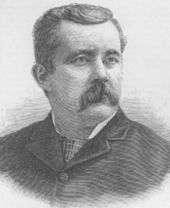Hamilton G. Ewart

Hamilton Glover Ewart (October 23, 1849 – April 28, 1918) was briefly both a U.S. Representative from North Carolina and a United States federal judge. He was a member of the Republican Party.
Early life, education, and career
Born in Columbia, South Carolina, Ewart attended private schools and moved to Hendersonville, North Carolina, with his parents in 1862. He was graduated from the literary and law departments of the University of South Carolina at Columbia, receiving an LL.B. in 1876. He was admitted to the bar in 1870 and commenced practice in Hendersonville, North Carolina, serving as a Referee in Bankruptcy, U.S. District Court for the Western District of North Carolina beginning in 1872, and as a delegate to the 1876 Republican National Convention.
Political activities
Ewart was elected mayor of Hendersonville in 1877, serving from 1878 to 1879. He served as member of the North Carolina House of Representatives intermittently, from 1887 to 1889, and again from 1895 to 1897, and from 1911 to 1913. Ewart was elected as a Republican to the Fifty-first Congress (March 4, 1889 – March 3, 1891). He was an unsuccessful candidate for reelection in 1890 to the Fifty-second Congress and also unsuccessfully stood for election to that seat in 1904.
Judicial activities
From 1895 to 1896, Ewart was a criminal court judge for Henderson County, North Carolina. He was then a circuit court judge for Raleigh, North Carolina from 1897 to 1898. Ewart was twice unsuccessfully appointed by President William McKinley as a recess appointment to a seat on the United States District Court for the Western District of North Carolina vacated by Robert P. Dick. The first time, Ewart was appointed on July 16, 1898, and served until the United States Senate adjourned without acting on the appointment on March 4, 1899. He was reappointed to the same seat on April 14, 1899, and the Senate again adjourned without acting on the appointment on June 7, 1900.
He moved to Chicago, Illinois, in 1916 and continued the practice of law until his death, in Chicago, April 28, 1918. He was interred in Oakdale Cemetery, Hendersonville, North Carolina.
See also
Sources
- United States Congress. "Hamilton G. Ewart (id: E000274)". Biographical Directory of the United States Congress.
- Hamilton G. Ewart at the Biographical Directory of Federal Judges, a public domain publication of the Federal Judicial Center.
| United States House of Representatives | ||
|---|---|---|
| Preceded by Thomas D. Johnston |
Member of the U.S. House of Representatives from North Carolina's 9th congressional district 1889–1891 |
Succeeded by William T. Crawford |
| Legal offices | ||
| Preceded by Robert P. Dick |
Judge of the United States District Court for the Middle District of North Carolina 1898–1899 |
Succeeded by himself |
| Preceded by himself |
Judge of the United States District Court for the Middle District of North Carolina 1899–1900 |
Succeeded by James Edmund Boyd |